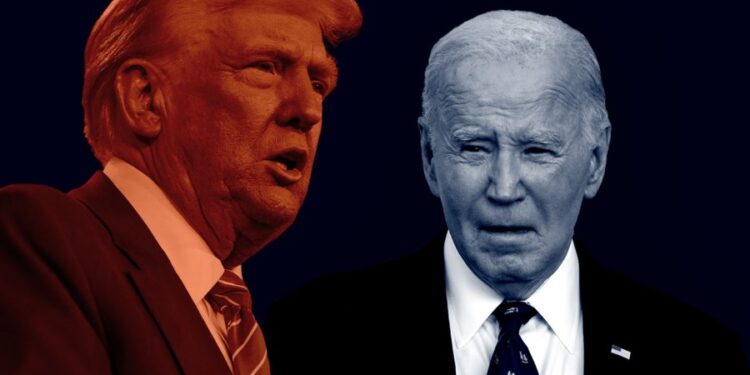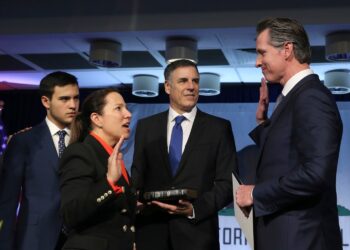
President-elect Trump is seizing the reins of power early and, according to lawmakers in both parties, already acting as president, while Joe Biden, in many ways, has kept a lower profile during the final days of his presidency.
Beyond dictating events on Capitol Hill, Trump is making headlines internationally by threatening to take back control of the Panama Canal and declaring that U.S. “ownership and control of Greenland is an absolute necessity.”
“It’s clear he’s in charge now,” Sen. Lisa Murkowski (R-Alaska) said of Trump’s impact on the spending debate when Washington was only a few hours away from a potential shutdown.
“Nobody is talking about, ‘Where’s Biden?’ in any of this. Trump is in charge,” she said. “Trump is in charge now, even without the election certification.”
At times, some lawmakers said it felt that Trump, not Biden, was wielding the veto pen as they scrambled to put together a last-minute deal to avoid a government shutdown.
“I’ve heard people criticize Trump for jumping in too soon. I think the main point is that Biden has vacated the field and Trump has filled the vacuum,” said Vin Weber, a Republican strategist.
Weber said Trump “got a lot” in the spending fight by getting Republicans to strip out more than 1,300 pages from the original deal.
“The fact that the sitting president of the United States didn’t have much of an impact on it is really telling, especially since the president has one of the [chambers] of Congress under his control, or his party’s control. It was quite something to watch,” he said.
Trump’s team claimed victory after congressional negotiators chopped the original 1,547-page funding bill down to 116 pages. The final package included disaster relief and economic aid to farmers, top GOP demands, but left out many Democratic priorities.
“Without President Trump, the American people would have been stuck with a 1500-page bill full of Democrat pork and pay raises for members of Congress. President Trump did more to secure this legislative victory as President-Elect than the sitting President Joe Biden, who has been even more checked out during his lame duck period than he has been the rest of his rudderless presidency,” said Karoline Leavitt, a spokeswoman for the Trump-Vance transition team.
Biden, meanwhile, largely stayed out of the food fight in Congress.
He didn’t speak to congressional leaders directly about the looming shutdown last week until Friday morning, although senior officials were in touch with Democratic lawmakers throughout the week.
Stephen S. Smith, a professor of political science at Washington University in St. Louis, said Trump is setting new standards by being so assertive weeks before Inauguration Day.
“Trump’s involvement is unprecedented,” he said, noting that Trump’s sudden opposition to the spending deal — spurred on by his adviser, Elon Musk — caught GOP leaders by surprise.
Smith said that Biden likely decided that jumping into last week’s congressional spending fight in a public way wouldn’t help resolve the impasse.
“I have no doubt he was being carefully advised about what was going on. Surely there must have been the thought that his open involvement — which would have been a form of criticizing the Republicans for something — would have only made it more difficult for the Senate Democrats to win some concessions from the House Republicans,” he said.
But Republican lawmakers vented their frustration of Biden’s low-key approach to the shutdown drama.
“I don’t know where he is,” Sen. Thom Tillis (R-N.C.) said of Biden’s lower-profile role in the fight over government funding and the debt limit.
Tillis said Trump “has been more of a president the last month than President Biden’s been.”
“I don’t see a lot of leadership coming from the White House. We’re getting more White House leadership from Mar-a-Lago than we’re getting from the White House,” he argued.
Sen. John Cornyn (R-Texas) said of Biden: “He’s checked out a long time ago.”
Democrats said Biden didn’t have much visibility to their caucus when Trump upended a bipartisan 1,547-page continuing resolution.
Biden’s allies say he didn’t need to step in to distract from Republican-on-Republican fighting over the debt limit.
But some Democrats thought the president could have been more vocal about the popular bipartisan proposals that Trump succeeded in stripping from a stopgap spending measure.
The package included several Democratic priorities, such as extensions of Medicare telehealth flexibilities, reauthorization of legislation to prevent pandemics and address opioid addictions, and payments to community health centers.
“I think they’re out of energy,” a Democratic senator who requested anonymity said of Biden.
“I haven’t heard anything directly from the White House,” Sen. Richard Blumenthal (D-Conn.) told The Hill on Friday afternoon, though he acknowledged he wasn’t aware of conversations at the leadership level.
Lawmakers were wondering about Biden’s role in the spending talks just as The Wall Street Journal published a report detailing how White House aides adapted “around the needs of a diminished leader” during Biden’s time in office.
Biden first spoke directly to Senate Majority Leader Chuck Schumer (D-N.Y.) and House Democratic Leader Hakeem Jeffries (D-N.Y.) about Trump’s demands for the stopgap spending bill on Friday morning.
Congress came within hours of a government shutdown after Trump announced his opposition to the funding deal lawmakers unveiled on Tuesday evening and demanded they instead pass a clean stopgap measure paired with legislation to extend the debt limit beyond 2025.
Biden didn’t respond to those demands directly, leaving it to Schumer and Jeffries to slap down Trump’s debt-limit demand.
But senior administration officials were in touch with Democratic lawmakers throughout the week, and White House press secretary Karine Jean-Pierre issued a statement Wednesday urging Republicans to “stop playing politics” with the bipartisan funding agreement.
“President Biden and his team worked hand-in-hand with Leaders Jeffries and Schumer to leverage Republicans’ mistakes against them, guaranteeing that the American public knew the House GOP and Trump were breaking their word and putting tax breaks for the wealthy above troops and Social Security recipients — all at the direction of the richest man in the world,” said White House senior deputy press secretary Andrew Bates.
Through Bates, the White House took credit for beating back Trump’s demand for Republicans to shut down the government unless Democrats agreed to a long-term extension of the debt limit.
“Our maneuvering prevented a Republican-triggered Christmas shutdown while exposing that the incoming majorities and administration will sell working families — including children with cancer — out to their well-connected billionaire donors at the drop of a hat,” he said, referring to Musk’s involvement in the spending fight.
Biden allies have also pushed back on the criticism by pointing to his accomplishments.
Democrats claimed a big victory on Friday after the Senate confirmed Biden’s 235th judicial nominee, surpassing the 234 judges confirmed during Trump’s first term in office.
Biden also jumped back onto the front page Monday by commuting the sentences of 37 of 40 federal prisoners on death row.
A White House official pointed to his historic trip to Angola earlier this month and the total amount of private sector investments in clean energy, semiconductor and other advanced manufacturing hitting $1 trillion in November.
Even so, Biden’s approach to his final weeks in office have contrasted sharply with Trump’s dominance of the media spotlight in recent weeks since winning the election.
Trump delivered bombshell headlines over the weekend by declaring he would consider retaking control of the Panama Canal, which he called a “vital national asset,” and vowing to rename Denali, the nation’s tallest mountain, to Mount McKinley.
He topped it off Sunday by posting on Truth Social that U.S. “ownership and control of Greenland is an absolute necessity.”
Political experts and strategists say Trump’s vocal positions on a range of issues is unusual compared to past presidential transitions.
Smith, the political scientist at Washington University, called Trump’s loud foreign policy pronouncements during the transition “unusual.”
A sign of his impact was visible north of the border.
Trump’s threat to slap heavy tariffs on Canada, one of the United States’ closest allies, has weakened Canadian Prime Minister Justin Trudeau, and Canada’s finance minister, Chrystia Freeland, abruptly resigned after a disagreement over how to respond.







